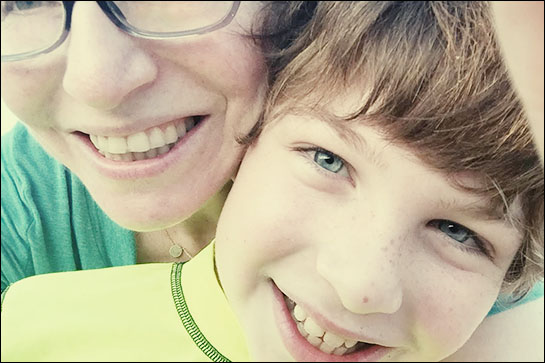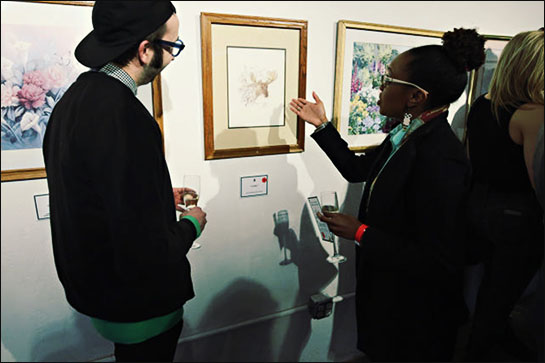Join me (and my kids!) in Aspergers heaven

This post is about a new course I’m doing. Oct 22.
But first, I have stuff to say. I recently wrote about the breakfast table effect, which explains why kids who have great science projects before college have parents who are scientists: they talk about science over breakfast because that’s what the parents like to talk about.
So what the hell was I thinking having both kids play string instruments? Because there’s a breakfast table effect with that, too, and we don’t have it. So I’ve had to learn so much about music careers and I still am way behind parents steering their kids from experience. And I’ve also had to learn about science projects. I mean, I didn’t have to learn this stuff, but it kills me to think that my kids are at a disadvantage because other kids have such knowledgeable and connected parents. I can’t stand it.
So I read scientific papers for three years, trying to figure out how to help my son. First I just learned how to apply my entrepreneurial skills to the science industry. Labs have a lot of grant money to spend. They buy lab equipment. And they buy human cells. You can even search online stores by animal parts.
I told myself to focus on learning what I need to help my kid compete with the breakfast table lottery winners. We realized that we know a lot about autism in our family. Because everyone has autism. So my son and I started reading papers about autism and we discovered a whole world of academic knowledge that is so difficult to say to the public that people don’t bother.
For example, girls who have more typically male traits—like strong interest in math and low interest in what they wear—have a high propensity toward autism. Most women who have tenure track positions in science have undiagnosed autism (because right now 96% of women are undiagnosed), so there’s huge pushback from female academics about making this research public.
(Hiding unpleasant research has precedent. We know that economically advantaged babies do not have better outcomes from breastfeeding. I mean, they might, but research is only able to show that breastfeeding improves outcomes for economically disadvantaged babies.)
At this point, my son has completed three experiments and tried many others that failed. And I’ve become addicted to reading research hidden in medical journals far away from mainstream media. Here are a few examples:
- The in-school approach to students with autism undermines the future success of those kids.
- Homeschoolers have a very high rate of autism, which helps those families to be successful.
- Adults with autism do not need typical friendships or typical hygiene to be successful.
In the meantime, I’ve coached hundreds of people with autism. It’s been fascinating to me how similar we all are to each other, and how much I learn from talking with other people about their autism experience.
I created a course about autism to tell you about everything I’ve learned from the science journals and coaching. The course is October 22-25, 9-10 pm Eastern. Each night there will be a live video (or you can watch it recorded) and there will be daily written material as well. The course is maybe more like a podcast, or a party for people who don’t like parties. But I’m calling it a course and you can read more about it here.
And you sign up here.
Those two links are actually the same. But I want to do a really good job getting you to buy this course because talking candidly with people who have autism has helped me so much, and I want you to experience that amazingness as well.
Bonus! I just realized my younger son has autism. That’s right. I saw my little son being little every day and I missed the autism every day, and I’m still telling you I’m an expert. That said, once we could both see it we were both shocked. So we sorted out our feelings and our ideas by talking together on three-minute videos. And if you buy the course in the next two days and enter the code HOMESCHOOLING I’ll send you our first two videos, unedited.



This course looks very interesting! Maybe you should publish this post in your careers tab as well?
I go back and forth all the time as to what should be published on the other blog and what should be published here. What I know for sure, though, is that people shouldn’t create a second blog. A blog is something that grows and changes with the blogger so there is theoretically not a need to have two.
Penelope
What if you haven’t told your (homeschooled) son he has aspergers (or autism, as he was diagnosed) because you don’t want him to fixate and think there is something wrong with him, because you know he is amazing, and brilliant? And your husband his dad is an obvious undiagnosed aspie? Is there even merit to knowing? What age is right for that conversation when all parties are brilliant but vulnerable? I’ll have to take your course.
Wendy, it’s really important to tell him. I don’t know anyone who is glad they didn’t know about having Aspergers. It’s very hard to navigate the world when you can’t “just do” what people think you should. Aspergers explains to your son why things are the way they are. And it also explains to him why he understands many things faster than other people. Your son doesn’t know why he’s so smart in some things. He doesn’t know why he’s so slow to understand other things. Everyone has strengths and weaknesses, but with Aspergers it’s extreme. He deserves to know why he is so extreme. Knowing ourselves better and better is the only thing we are guaranteed to be able to do in our lives. You should help him with that.
Penelope
“So what the hell was I thinking having both kids play string instruments? Because there’s a breakfast table effect with that, too, and we don’t have it. So I’ve had to learn so much about music careers and I still am way behind parents steering their kids from experience. And I’ve also had to learn about science projects. I mean, I didn’t have to learn this stuff, but it kills me to think that my kids are at a disadvantage because other kids have such knowledgeable and connected parents. I can’t stand it.”
If you look too closely at that logic, there would never be anyone doing things at which their parents are not expert—how sad would that be? How many musicians would we have missed because their parents were not musicians? The breakfast table effect is something, but it’s not everything. I think the main point of the breakfast table is actual conversation between adults and children that demonstrates value and respect and teaches kids that adults don’t know everything and that there is value in discovery and persistence.
It makes sense that a person with Asperger’s* would not necessarily recognize Aspergers in his or her offspring. If part of the condition is persistent impairment of reciprocal social communication, then a child exhibiting such might not be noticed by an adult experiencing the same. You could go through the kid’s entire childhood just being happy your kid is normal like you.
*NB: Asperger’s no longer exists as a diagnosis. Since DSM-V, it’s been split between Autism Spectrum Disorder and Social Communication Disorder (aka Semantic Pragmatic Disorder). The principal difference between the two is that the latter does not include restricted, repetitive patterns of behavior, interests, or activities. However, Asperger’s appears to persist as a social identification.